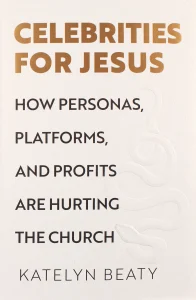I swallowed this book over one weekend and it gave much to digest. Perceptive, generous-hearted but pulling no punches, its author Katelyn Beaty, is a respected journalist who has written for both the secular press (New York Times, The Atlantic and The Washington Post) and faith-based media including Christianity Today, of which she was a Managing Editor. She is, then, no stranger to the media, its “star-making” power and its lure. Beaty writes with the assuredness and, often, affection of an insider of both church and the media, who wants things – us – to be better.
Beaty asserts that while the decline of the Western church continues, “the hunger for transcendence is as strong as ever” and it is quenched, albeit briefly and ultimately unsatisfyingly, online, where ‘social media has democratised the celebrity pipeline.” Quoting Deena Weinstein and Michael Weinstein, “Celebrity is methadone for the soul”, and social media is its relentless pusher.
Beaty’s definition of celebrity is “social power without proximity”, and she unpacks its implications over the eight highly readable chapters. Essentially, the greater the distance between the audience and the pastor/performer, the more dangerous it is for both – it distances in perspective and trades intimacy for superficial touch points in which relationship is aped rather than actual.
Most importantly, it does something to the person in the spotlight: it elevates them above us mere watchers and listeners, in a way that is deeply unbiblical and un-Christlike. “Celebrity power breeds the lie that celebrity leaders deserve better, finer things because they are better, finer people.”
A message designed for entertainment will transmute the message of the gospel into a message of entertainment.
After setting up the reality of mass media and its power to make seemingly anyone a celebrity, Beaty’s gaze turns inward from the world and its Instagram gods to the church. Here, she makes her charge that “the American church has overall mimicked celebrity culture rather than challenged it.”
She charts the rise of the celebrity pastor, starting with Billy Graham and moving on to the rise and fall of those other US megachurch leaders who followed, including Bill Hybels, Ravi Zacharias, Carl Lentz and the amusingly-labelled “crop of deeply v-necked megachurch pastors”. As an aside, the examples are all US-based and all male; she intimates females are not immune, but there are no examples and it would have been interesting if she explored why a little more.
Graham, we are told, developed a Modesto Manifesto (named for the hotel room he was staying in rather than an Italianate appeal to modesty) with which he sought to protect himself and his fellow male leaders from the triple lures of money, sex and power. Those who came after him, Beaty suggests, might have been wise to implement the “Billy Graham Rule” and his commitment “to never be alone with a woman who is not your wife”.
But, asserts Beaty, the impact goes beyond the messenger to the message: “the medium doesn’t just transmit a message; it changes it. A message designed for entertainment will transmute the message of the gospel into a message of entertainment.” Heavy on charisma, light on gospel is the idea. Beaty says that while Graham contributed to the problem of celebrity, he also tried to “personally guard against it”. Not so, Beaty argues, for many Christian leaders today who “are swept up in the power of celebrity, with few tools to detect how it operates in their own souls and few safeguards for protecting against its outsize power in their churches and organisations.”
That is the key charge: that these pastors have become the very things they should be steering us and themselves away from.
The abuses and falls of Bill Hybels and Willow Creek, Ravi Zacharias, Mark Driscoll and Mars Hill Church are all detailed and deconstructed, and Beaty breathes new life, context and relevance into the stories we have all heard. She is quick to point out that money itself is not the problem; the love of money is, keeping us “focused on earthly not eternal things.”
Jesus, she also reminds us, hung with the wealthy – the Justin Biebers, Selena Gomezes, and Chris Pratts of his time, like Zacchaeus and Joseph of Arimathea – but he “did not become wealthy in order to minister to them”. That is the key charge: that these pastors have become the very things they should be steering us and themselves away from. We are left in no doubt that this has huge implications for the souls of individuals and the soul of the church.
Having worked all my life in publishing, I was particularly gripped, and convicted, by the chapter on the Christian publishing industry. We can, as an industry and as individual editors and publishers, be complicit in exploiting and perpetuating “the endless quest for platform”. Publishing means literally to make widely known, but if publishers merely amplify marketing rather than message, we compromise our mission to nurture and lift up faith voices that inform, guide and nurture the church.
Rather, publishers should be “able to deftly balance questions of profitability with questions of writerly skill, training and wisdom”, but, she bemoans, many “haven’t been able to resist the ascendency of celebrity in a consumerist culture” with “platform, reach and influence” playing “an outsize role in who gets to write for the broader church.”
Ouch.
I would have liked to read more about what getting it right looks like practically, about ministries that grow disciples rather than likes, and about how we come back from where we are. But Beaty leaves us in no doubt about what the right way is – indeed what it has always been: “a vision of the Christian life that begins and ends with producing ‘little Christs’ … In order to go up we have to go low.”
Amen to that.
Susannah McFarlane is Head of Publishing at Bible Society Australia, which includes Acorn Press. She is also an author and has written some of Australia’s most successful children’s book series, as well as non-fiction for adults.



